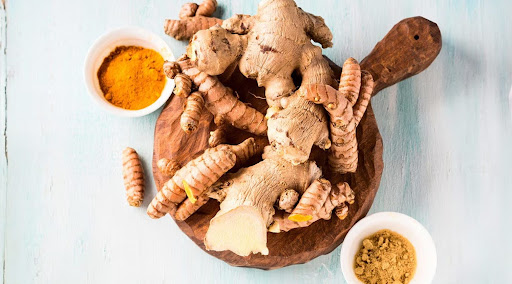Ginger: Health Benefits and Dietary Tips

This is the ultimate ginger guide! For millennia, people have valued this tangy root as a potent natural medicine as well as a way to increase flavor. Ginger’s health-promoting properties have been used for centuries, from traditional Chinese medicine to contemporary smoothies. Ginger should take center stage in your cooking and wellness regimen, whether your goal is to reduce inflammation, calm your stomach, or just add some flavor to your food.
What Is Ginger?
Zingiber officinale, the technical name for ginger, is a flowering plant whose underground stem, or rhizome, is used extensively as a spice and natural remedy. Ginger is a Southeast Asian native that has long been used in Chinese, Ayurvedic, and conventional Western herbal remedies.
Also Read: Standardized Botanical Extracts
It’s typically available in several forms:
- Fresh root
- Dried or powdered spice
- Pickled slices
- Candied ginger
- Ginger tea or juice
- Supplements (capsules or extracts)
No matter how it’s consumed, ginger delivers a punch of health benefits.
Top Health Benefits of Ginger
1. Digestive Support
One of the greatest natural treatments for indigestion and nausea is ginger. It helps food pass through the stomach more effectively by increasing gastric motility and activating digestive enzymes.
Helpful for:
- Morning sickness during pregnancy
- Motion sickness
- Post-operative nausea
- Indigestion and bloating
How to use: Sip on ginger tea or chew a small piece of candied ginger before or after meals.
Also Read: Supercritical Fluid (SCF) Extracts
2. Anti-Inflammatory and Pain Relief
Bioactive substances found in ginger, such as paradol, shogaol, and gingerol, have potent anti-inflammatory properties. With no negative side effects, these substances function similarly to non-steroidal anti-inflammatory medicines (NSAIDs).
Helpful for:
- Arthritis and joint pain
- Muscle soreness after workouts
- Menstrual cramps
How to use: Add fresh grated ginger to warm water with lemon for a natural pain-relief drink. Ginger supplements can also be helpful in standardized doses.
3. Immune System Boost
Your immune system is weakened by inflammation and oxidative stress, which ginger’s antioxidant qualities assist your body fight off. It is helpful in preventing infections because it also possesses antibacterial qualities.
Helpful for:
- Colds and flu
- Sore throats
- Respiratory infections
How to use: Boil fresh ginger with honey and lemon for a comforting immune-boosting tea.
4. Supports Heart Health
Ginger may help lower heart disease risk factors, according to research. By functioning as a natural blood thinner, it lowers blood pressure, lowers LDL (bad cholesterol), and may help avoid blood clots.
How to use: Use ginger as a regular seasoning in cooking or as a morning tonic with warm water.
5. Blood Sugar Regulation
Ginger has demonstrated promise in enhancing insulin sensitivity and assisting with blood sugar regulation. Those who have type 2 diabetes may benefit most from this.
How to use: Try incorporating ginger powder into smoothies or oatmeal for a gentle metabolic boost.
6. Improves Brain Function
Oxidative stress and chronic inflammation can hasten brain aging and lead to cognitive loss. The anti-inflammatory qualities of ginger may enhance memory and safeguard brain health.
How to use: Add ginger to green tea or include it in herbal blends focused on mental clarity.
7. Aids in Weight Management
According to some research, ginger may help people lose weight by lowering hunger and boosting thermogenesis, or the burning of calories.
How to use: Include ginger tea between meals to curb cravings naturally.
Dietary Tips: How to Add Ginger to Your Meals
Ginger is simple to use in both savory and sweet recipes because of its sharp, slightly sweet, and spicy flavor. Here are a few easy and delicious ways to eat ginger every day:
Breakfast
- Smoothies: For a drink that speeds your metabolism, blend fresh ginger with banana, spinach, and citrus.
- Oatmeal: For a comforting twist, add a pinch of cinnamon and ground ginger.
- Tea: Have some ginger green tea or warm ginger-lemon water to start your day.
Lunch
- Dressings for salads: To make a zesty dressing, combine ginger, olive oil, soy sauce, and lemon juice.
- Soups: To add depth and warmth to lentil, pumpkin, or carrot soup, add grated ginger.
- Stir-fries: In Asian-style cooking, ginger goes well with veggies, garlic, and sesame oil.
Dinner
- Curry: Sautéed ginger, garlic, and onions are frequently the first ingredients in Thai and Indian curries.
- Rice Dishes: Cook rice or quinoa in a broth scented with ginger to infuse it with ginger.
- Marinades: To marinate chicken, tofu, or fish, combine fresh ginger, soy sauce, and honey.
Snacks & Desserts
- Eat candied ginger sparingly as a sweet treat or digestive assistance.
- Make ginger cookies by baking them with cinnamon, molasses, and ginger powder.
- Fruit Bowls: For a tropical touch, add grated ginger to fresh fruit such as mango, pineapple, or pear.
Precautions and Considerations
While ginger is generally safe for most people, a few precautions are worth noting:
- Ginger is safe to use in moderation during pregnancy, but before taking any supplements, see your doctor.
- Bleeding disorders: If you are on blood thinners, talk to your doctor because ginger may thin your blood.
- High doses: Unless a physician advises otherwise, limit your intake to no more than 4 grams of ginger per day, either fresh or powdered.
Choosing the Right Ginger
When buying ginger, freshness matters:
- Fresh ginger root should smell spicy, be firm, and have smooth skin.
- For optimal strength, use organic, non-irradiated types of powdered ginger.
- Tea and Supplements: Seek out goods that have few ingredients and prominently display the amount of ginger.
Peeled or unpeeled, fresh ginger can be frozen for a longer shelf life or kept in the refrigerator. Ginger powder should be stored out of direct sunlight in a cool, dry location.
Final Thoughts
More than simply a common ingredient in the kitchen, ginger is a natural powerhouse that may improve your immune system, aid with digestion, lower inflammation, and give your food a spicy edge. Ginger may be a modest but powerful addition to your everyday wellness regimen, whether you drink it in tea, add it to stir-fries, or take it as a supplement.
Frequently Asked Questions (FAQs)
Q1. What is the recommended daily intake of ginger?
A: Most adults can safely consume up to 4 grams, which is equivalent to 1 tablespoon of fresh ginger or 1 teaspoon of powder.
Q2: Is it possible to lose weight using ginger?
A: When combined with a nutritious diet, ginger may help control weight by modestly increasing metabolism and decreasing appetite.
Q3: Can acid reflux be treated with ginger?
A: Ginger can calm the stomach when taken in moderation. However, in sensitive people, overindulgence may irritate the stomach lining.




